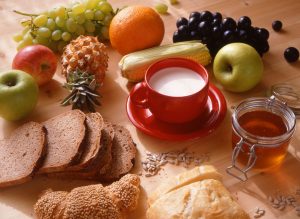At any age, a good and varied diet is a prerequisite for health. As people become older they may be less active and need fewer calories but their basic vitamin, mineral and protein requirements do not diminish with age.
Many of the characteristics attributed to old age, such as lack of energy and enthusiasm, constant tiredness, and depression may simply be signs that the body is undernourished and under-exercised. Neglect of the body, rather than the natural process of aging, can lead to a general lack of health and wellbeing. If you are past middle age you owe it to yourself to give your body a chance to maintain and repair itself with the best materials possible.
As people age, the number of functioning cells decreases. This, together with a decrease in physical activity, reduces the energy needs of the older adult, and if calories are not reduced when activity declines, the excess will be stored as fat.
The foods to watch when trying to restrict calories are those with little nutritional value such as sugar, cakes, sweet biscuits, cordial and soft drinks, lollies, chocolates, cream and cooking fats and oils. Fats, the most concentrated source of calories, are also harder to digest and absorb with age and too much fat may result in indigestion and discomfort for some. As well as reducing fat, sensitive digestion can be helped by eating small meals often, rather than three substantial ones.
Protein is needed for growth and repair of body tissues at all ages. One or two servings of meat, poultry, fish, cheese, eggs, nuts, or legumes (dried beans, peas or lentils) should be eaten daily for protein, vitamins and minerals.
It is also wise to eat less salt, both at the table and in cooking, as excesses may raise your blood pressure.
The calcium needs of older people seem to be as great as the needs of younger adults, because the body continually loses this essential mineral. This loss must be replaced to avoid ill health and bone disease. Osteoporosis (“porous bones”) is a common disease occurring mostly in women after the menopause. Calcium is lost from the bones, which become porous and can then fracture easily.
It is essential to have a daily consumption of milk or milk foods for calcium. The recommended daily intake is 300ml (½ pint) milk a day. Powdered skim milk is one good inexpensive way of adding calcium to the diet.
A healthy diet should also be high in good sources of fiber. Constipation, a problem aggravated if fruit and vegetables are avoided, can be prevented or treated with adequate fibre. Fluids are also essential. Regular elimination requires the intake of 6 to 8 cups of fluid a day.
Some fruits and vegetables also provide us with vitamin C. This vitamin ensures healthy gums and sound tissues, and the quick healing of cuts, sores, and bruises. Good sources are citrus fruits or juices, tomatoes, berries, cabbage, capsicum, rockmelons, cauliflower, broccoli and brussels sprouts. Try to include some raw fruit or vegetables daily.

There are many ways to minimise food costs without sacrificing nutritional value; plan menus and shop to a list; buy fresh fruits and vegetables in season; make good use of leftovers by adding a different seasoning or by serving the food in a different form; do not hesitate to ask for small quantities of perishable foods, such as delicatessen meats, cheese, fruits and vegetables.
When comparing prices, calculate the cost per serving rather than price per kilo — foods with a lot of waste, such as fat or bone, are often less economical than they seem. Lamb neck chops may give only four servings to the kilo while a hamburger steak may give eight servings.
People who live alone must also overcome the desire to subsist on easily prepared comfort foods such as tea, and bread and jam. Now you have the time to linger over food and really appreciate it, make meals a special occasion.
You can influence the quality of your later years. A good varied diet, coupled with moderate, regular cardiovascular fitness activities, like walking, will do much to ensure a happy and healthful old age.

References:
http://www.rice.edu/~jenky/caryn/protein.html
https://ods.od.nih.gov/factsheets/Calcium-HealthProfessional/
By Adele
Adele is a dietician, researcher and blogger, having ten years of experience in Diet and Health Care industry. She enjoys writing about list of cardiac diet foods, and guiding people through a healthy 14 day diet for a healthful weight loss.


